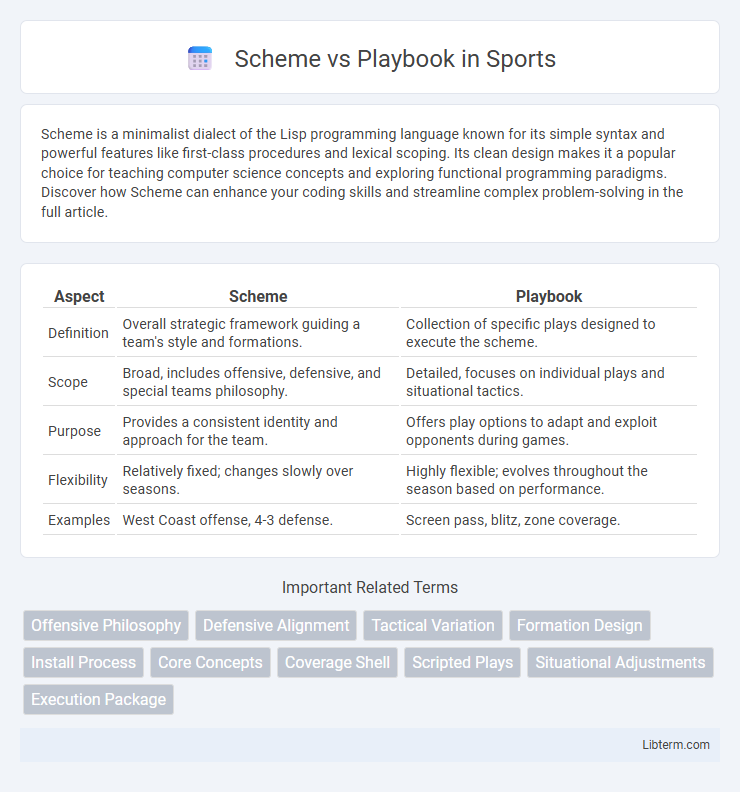Scheme is a minimalist dialect of the Lisp programming language known for its simple syntax and powerful features like first-class procedures and lexical scoping. Its clean design makes it a popular choice for teaching computer science concepts and exploring functional programming paradigms. Discover how Scheme can enhance your coding skills and streamline complex problem-solving in the full article.
Table of Comparison
| Aspect | Scheme | Playbook |
|---|---|---|
| Definition | Overall strategic framework guiding a team's style and formations. | Collection of specific plays designed to execute the scheme. |
| Scope | Broad, includes offensive, defensive, and special teams philosophy. | Detailed, focuses on individual plays and situational tactics. |
| Purpose | Provides a consistent identity and approach for the team. | Offers play options to adapt and exploit opponents during games. |
| Flexibility | Relatively fixed; changes slowly over seasons. | Highly flexible; evolves throughout the season based on performance. |
| Examples | West Coast offense, 4-3 defense. | Screen pass, blitz, zone coverage. |
Understanding the Basics: Scheme vs Playbook
A scheme outlines the overall offensive strategy, detailing formations, player roles, and core concepts used throughout a football season to establish a consistent approach. A playbook, however, is a comprehensive collection of individual plays drawn from the scheme, providing specific instructions for in-game situations and adjustments. Understanding the distinction between a scheme and a playbook is crucial for grasping how coaches develop and execute football strategies on both macro and micro levels.
Defining Football Schemes
Football schemes define the overarching strategy and structure of a team's offense or defense, determining player roles and formations to exploit opponents' weaknesses. Schemes focus on the team's identity, such as a West Coast offense or a 3-4 defense, emphasizing consistent, long-term philosophy. Unlike playbooks that contain specific plays and situational tactics, schemes establish the foundational approach guiding those play designs.
Defining Football Playbooks
Football playbooks define strategic collections of plays used by teams to systematically execute offensive or defensive maneuvers. Schemes represent overarching tactical philosophies that shape the structure and approach of the playbook, such as zone defense or West Coast offense. Understanding the distinction helps teams align their playbook designs with specific football schemes to maximize effectiveness on the field.
Key Differences Between Schemes and Playbooks
Schemes define the overall strategic framework of a team's offense or defense, specifying formations, personnel, and general principles, while playbooks contain detailed, situational plays designed to execute the scheme effectively. Schemes prioritize long-term strategy and adaptable concepts, whereas playbooks offer specific instructions and adjustments for in-game tactics. The key difference lies in schemes shaping the team's identity and philosophy, with playbooks acting as a tactical manual for real-time decision-making and execution.
How Schemes Influence Team Identity
Schemes shape a football team's identity by defining the fundamental style of play, such as a West Coast offense emphasizing short, quick passes to control the ball and time of possession. This consistent approach influences player roles, team culture, and fan expectations, creating a recognizable brand. Unlike playbooks, which contain detailed situational plays, schemes establish the overarching philosophy that underpins all strategic decisions.
The Role of Playbooks in Player Preparation
Playbooks serve as comprehensive guides that outline specific plays, strategies, and situational responses, enabling players to anticipate and execute their roles effectively during games. Unlike broader schemes that define the overall strategic philosophy of a team, playbooks break down detailed assignments to enhance player readiness and decision-making under pressure. This granular approach in playbooks directly contributes to improved coordination, timing, and adaptability among players on the field.
Scheme Adaptation and Innovation
Scheme adaptation in sports emphasizes tailored strategies to leverage team strengths and counter opponents, fostering innovation through dynamic plays and formations. Playbook innovation involves continuously updating set plays with novel tactics and situational adjustments to maintain unpredictability and competitive advantage. Integrating adaptive schemes with an evolving playbook enables teams to respond effectively to changing game conditions and opponent tendencies.
Playbook Flexibility and Customization
Playbooks offer superior flexibility and customization compared to schemes by allowing organizations to tailor workflows, actions, and automation policies to specific operational needs and use cases. They provide dynamic decision-making capabilities with conditional logic, enabling adjustments in real-time based on evolving scenarios or threat intelligence. This adaptability enhances incident response efficiency and ensures that security measures align precisely with organizational priorities and regulatory requirements.
Scheme and Playbook in Game Planning
A scheme in game planning defines the overall strategic framework, outlining the structural offensive and defensive systems a team employs throughout the season. A playbook consists of specific plays and situational actions designed to execute within the scheme, providing detailed instructions for players during various scenarios. Effective game planning integrates both scheme and playbook to create cohesive strategies that optimize team performance and adaptability.
Impact of Scheme and Playbook on Team Success
A well-designed scheme provides the foundational structure and strategic framework that guides a team's overall gameplay, enhancing consistency and execution efficiency. Playbooks, comprising detailed plays and situational tactics, enable players to adapt and respond effectively during games, maximizing on-field performance. The synergy between a robust scheme and a versatile playbook directly correlates with improved team success by fostering disciplined execution and tactical flexibility.
Scheme Infographic

 libterm.com
libterm.com